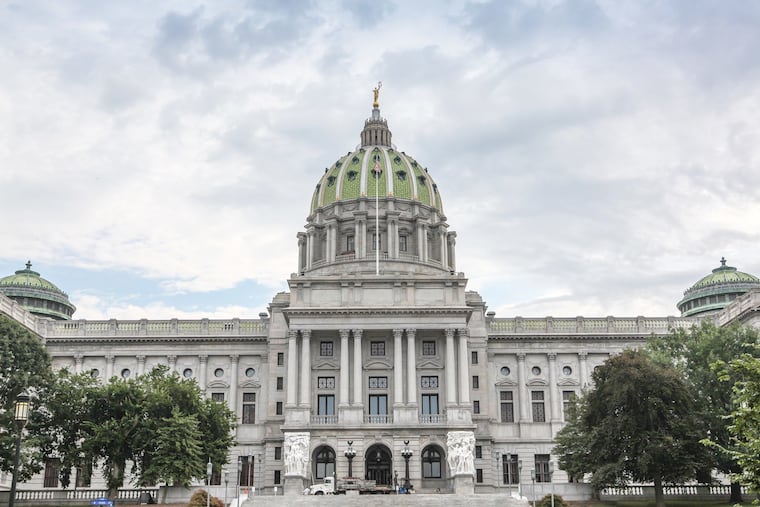Pa. House votes to ‘disapprove’ of entering Regional Greenhouse Gas Initiative, defying Gov. Wolf
Gov. Wolf says joining RGGI will reduce greenhouse gas emissions while creating green jobs. Republicans, however, present RGGI as a job killer in areas dependent on natural gas and coal.

Pennsylvania’s GOP-controlled House on Wednesday night voted after lengthy debate to approve a resolution designed to block Gov. Tom Wolf’s entry into the Regional Greenhouse Gas Initiative, an effort by 11 states to cap carbon dioxide emissions from fossil-fuel-fired power plants.
Joining RGGI would bring in revenue, create green jobs, and curb emissions, the administration contends. But Republican leaders maintain that it will kill jobs, especially in counties where coal and natural gas dominate, and won’t do much to lessen carbon emissions, which they say have been declining for years.
Wolf will almost assuredly veto the measure. The GOP failed to muster a two-thirds majority that would have prevented a veto.
However, proponents of RGGI say the vote on the concurrent resolution to “disapprove” of entry into RGGI will at least stall progress on the plan and cost Pennsylvania up to $200 million in an auction of carbon credits it could receive in the first quarter of the year. Legislators have 30 days to try to muster more votes and override a veto.
However, legislators are on Christmas break and won’t return until Jan. 4.
» READ MORE: Pa. GOP plans new attempt to prevent entry into regional climate initiative
Under RGGI, participating states establish a regional cap on CO2 emissions, with the cap adjusted downward over time to reduce emissions further. Large fossil-fuel emitters essentially buy allowances for carbon they emit through an auction.
That money would go back to Pennsylvania in what proponents call a market incentive but that the GOP leadership calls an “ill-advised energy tax on Pennsylvanians.” Pennsylvania would join neighboring New York, Maryland, New Jersey, and Delaware in RGGI, as well as Connecticut, Maine, Massachusetts, New Hampshire, Rhode Island, Vermont, and Virginia.
The vote was in line with other recent measures by the GOP to prevent entry into RGGI, including a legal challenge to stop a regulation setting carbon pricing from being published in the state’s official registry, the Pennsylvania Bulletin.
“This plan by the House to disapprove the regulations further confirms what we have known for months,” Elizabeth Rementer, a spokesperson for Wolf, said before Wednesday’s vote. “The Republican majority is united in opposition to the most significant step Pennsylvania can take to address the primary environmental threat facing the world. They still have no plan and have advanced nothing to try to address this increasingly critical threat, which is impacting Pennsylvanians every day. The governor remains strongly committed to addressing climate change and seeing this regulation take effect.”
On the House floor, Jim Struzzi (R., Indiana) called the Wolf administration “authoritarian” for using an executive order to enter RGGI and said entry “will be devastating for Pennsylvania” and especially for his county, which has two of the largest coal-fired power-generation plants in the state.
Struzzi said plants will close and move to Ohio and West Virginia, which aren’t in RGGI.
“Within Indiana County, we’re talking nearly 1,500 jobs and about $873 million,” Struzzi said.
Rep. Greg Vitali (D., Delaware) said RGGI would be a job saver while addressing climate change, an ever-more urgent issue given the increase in major storms, including this year’s Ida, that have cost “hundreds of billions” in damage in the United States.
“Pennsylvania is a major greenhouse gas producer,” Vitali said. “RGGI is the most important thing Pennsylvania can do right now to address climate change. This legislature has done nothing and shown no inclination to do anything on climate change.”
He also disputed the notion RGGI carries a tax, calling it a “market-based approach.”
“No form of energy is either required or prohibited,” Vitali said. “RGGI is not a tax. It simply requires polluters to buy allowance for polluting.”
Jacquelyn Bonomo, president and CEO of the nonprofit environmental group PennFuture, called the House action “nothing more than obstructionist politics at its worst.”
“The science is clear,” she said in a statement. “Pennsylvania must transition to a clean energy economy, and we must do everything in our power to lower our carbon emissions as quickly as we can.”